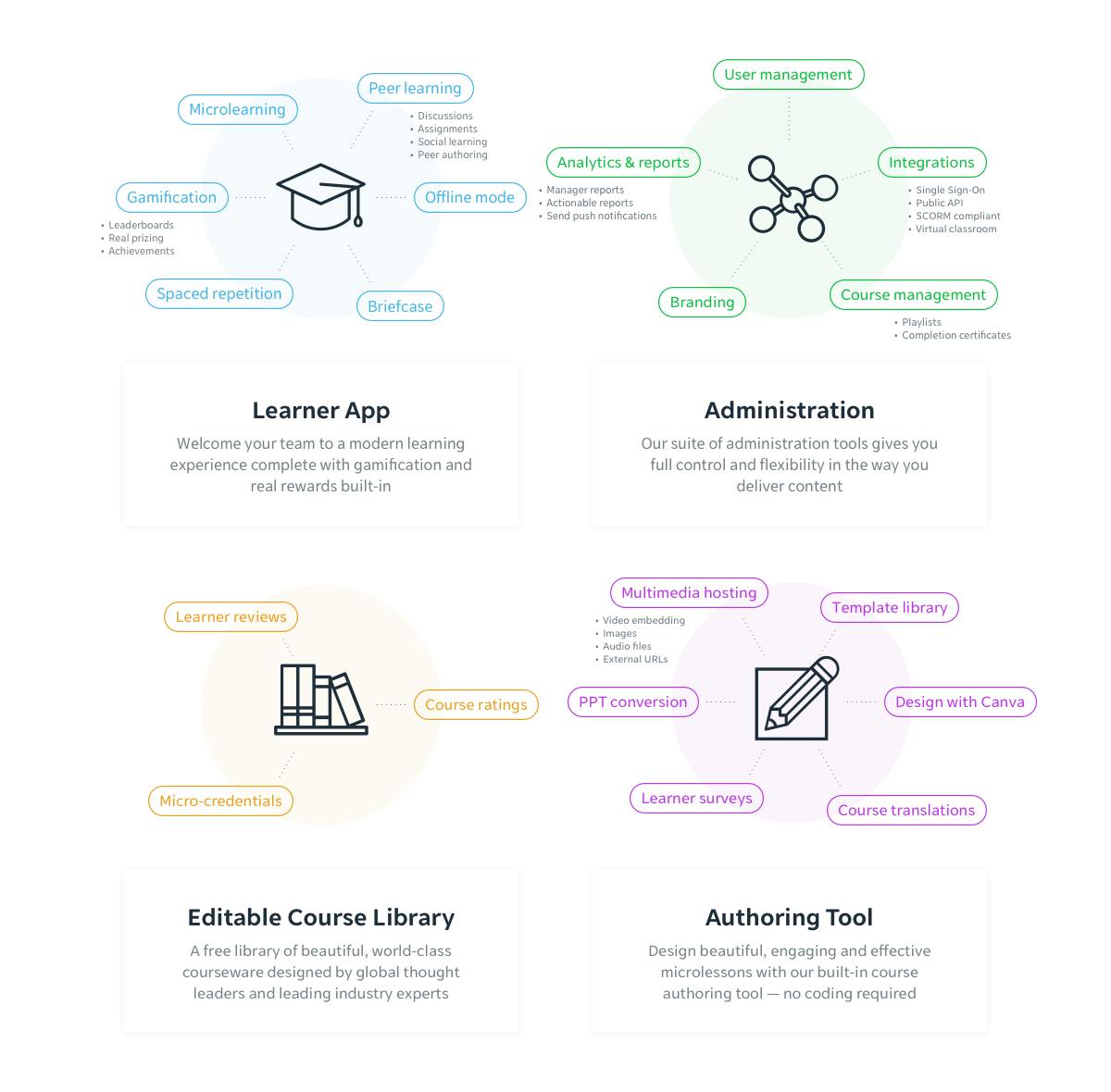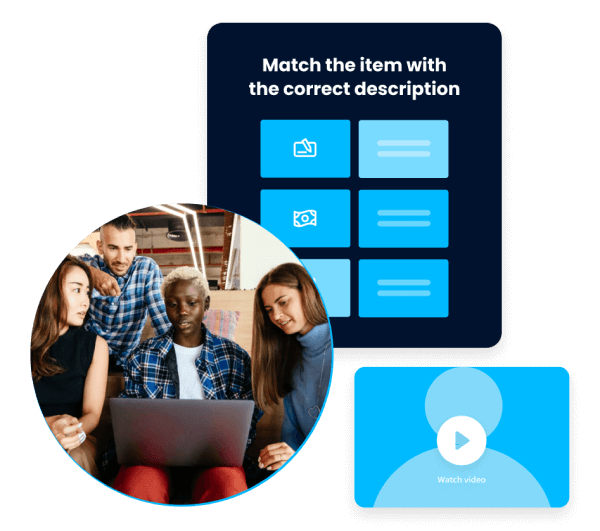Organizational learning

Today’s global environment is characterized by the constant change of organizations, which cannot be successful if employees are not aware of the need for change and if they do not adopt a strategy promoting continual evolving. Employees and the knowledge they have are the most important means by which a company can create a competitive advantage. Therefore, companies are becoming aware that they need to do more in the field of employee development.
Open Organizations & Organizational Learning
When a company supports an “open” organizational climate and feedback in support of organizational learning, and when it includes management in the educational process, we are talking about a learning organization. The concept of a learning organization has recently become a popular way of softly changing an organization.

The definition of organizational learning is the ability to create, acquire, and transfer knowledge and change behavior at all levels of the company. The foundation of a learning organization is an active and creative person who feels a certain responsibility and takes care of acquiring new knowledge and skills for their work, participating in the design of educational programs, transferring acquired knowledge, and using it in practice. There is an awareness in the learning organization that change is a necessary factor of business, an opportunity to learn and improve the existing situation.
Learning enables a faster and more efficient response to a complex and dynamic environment, increases the transfer of information, understanding, and success of the decisions they make in the organization. Organizational learning is important for innovation and is a bridge between work and creativity.
Organizational Learning & Knowledge Management
Knowledge is power and if we share knowledge, we also share power. Therefore, knowledge management is the basis of the learning policy of a learning company. The company wants to use as much knowledge as possible that employees have, and in return, it must respect them, trust them, believe in them, and give them the opportunity for creativity and self-realization.

A learning organization is one that can create, acquire, and transfer knowledge and reflect new knowledge and insights in changed behavior. The main activities of the learning organization are systemic problem solving, experimenting with new approaches, learning from personal experience and history, learning from the experiences and best practices of competitors, and fast and efficient transfer of knowledge among employees of the organization.
We can describe it as space where people are constantly expanding their abilities to create desired results. New patterns of thinking are nurtured in this space, there is a voluntary collective effort, and people are constantly learning how to learn.
Effective knowledge management requires a combination of people and technology. While humans are needed to understand, synthesize, and interpret various types of unstructured knowledge, computers and communication systems enable its collection, transmission, and distribution. Computer and network systems and their use enable an easy and fast exchange of knowledge regardless of distance, and can greatly contribute to building a learning organization.
Organizational Learning: Content vs Conditions
Although probably, the concept of a learning organization is still not entirely clear, its success has less to do with definition or content than with learning conditions and mechanisms by which people can learn more and faster.
Among the factors influencing the likelihood that learning will occur, most often mentioned are corporate culture and leadership conducive to learning, a strategy that allows flexibility, an organizational structure that enables innovation and new insights, and a supportive environment.

The above factors have recently become apparent in the context of researching a reconfigurable organization that can quickly combine and recombine skills, competencies, and resources across the enterprise to respond to changes in the external environment.
However, given that learning is essential for organizations that are dynamic and want to be reconfigurable, it is necessary to create a context conducive to learning.
With all this in mind, it can be said that for many companies the process of becoming (being) a learning organization is closely linked to the integration and usage of an appropriate learning management system.
Key Benefits of LMS Organizational Learning
The LMS enhances the learning process in four key areas:
- Innovation – finding and applying new ideas, organizing people into‘ virtual ’ development teams, creating forums for collaboration and exchange of ideas, without time and space constraints
- Response speed – is related to the availability of information in the organization to those who need it and when they need it, to solve customer requirements faster and better.
- Productivity – summarizing and sharing business practices as well as other useful knowledge to eliminate redundant activities and reduce problem-solving time.
- Education – continuous development of skills and knowledge of employees through “on-line” training during work, distance learning, as well as other employee development methods to raise the level of ability to do better jobs.
It is not enough to just implement a LMS platform. A problem arises in situations and organizations in which managers perceive time devoted to learning as a necessary but imposed task.
Why EdApp is the Best Organizational Learning Solution
We believe that EdApp has the ability to make the transformational path less strenuous and more fun.
EdApp’s design and development are guided by this philosophy. The features are not just supporting the four key areas mentioned above, but offer a wide range of possibilities to embrace the learning organization concept and support the employee growth and improvement.

Some of the ways through which EdApp strengthens companies quest for knowledge:
- The adaptation and flexibility of the app enable uninterrupted learning and knowledge base that can be accessed at any time and any place (EdApp has a fully integrated mobile version)
- The systematic approach of the app helps users see how to use and change the system more effectively and work in tune with the larger processes both inside and outside of the organization. The analytics and reporting tools allow continuous evaluation and thus on-time reaction.
- The combination of pre-designed courses with the option for customization allows participants to expand the experience and discover themselves. This encourages and supports nonlinear thinking.
- Companies have more time to individualize the approach, i.e. help employees who need more attention and can focus on activities that require their participation while employees can learn independently.
- Learning through multimedia mirrors the way the human mind thinks, learns, and remembers by simply moving from words and images to sounds, while at the same time enabling interpretation, analysis, and in-depth research. The combination of multimedia elements enables participants in e-learning processes to learn more spontaneously and naturally because they can learn in that way, that is, use the sense (s) they prefer.
- Development of rating models through gamification leads to user striving to improve and fully understands the impact of their actions and decisions
- Team learning transforms conversational and collective thinking skills that groups of people can reliably develop intelligence and abilities on a larger scale than the sum of the talents of individual members

In this way, EdApp can answer organizations’ needs to constantly monitor the environment and determine what should they learn next to better cope with and anticipate external pressures, and respond to internal demands as well.
EdApp is free to train teams large and small, and best of all, you can educate unlimited learners! Sign up for free.
Author
